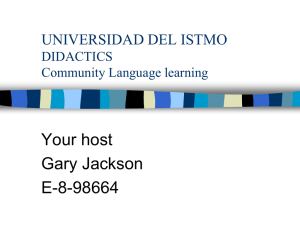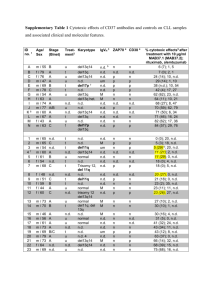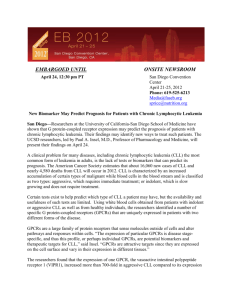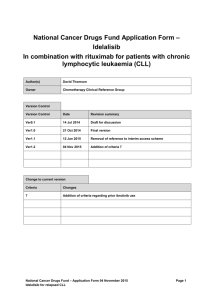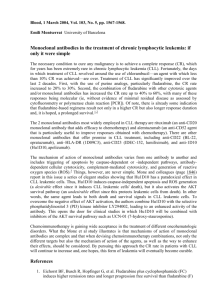John C. Byrd, MD, D. Warren Brown Chair of Leukemia Research
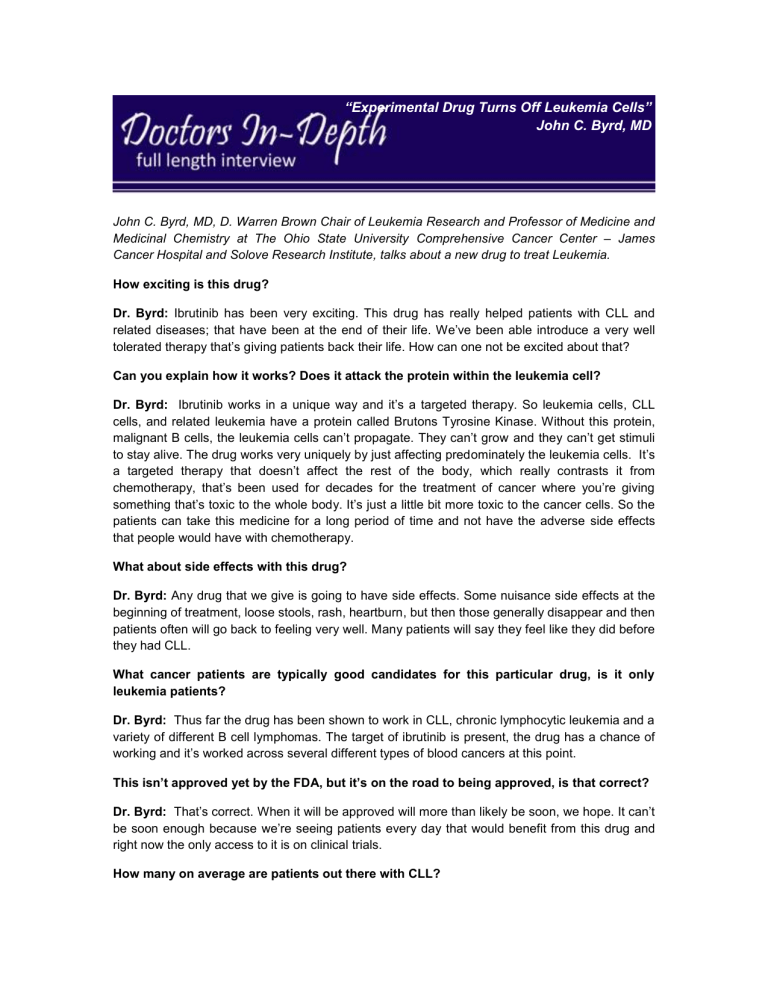
“Experimental Drug Turns Off Leukemia Cells”
John C. Byrd, MD
John C. Byrd, MD, D. Warren Brown Chair of Leukemia Research and Professor of Medicine and
Medicinal Chemistry at The Ohio State University Comprehensive Cancer Center – James
Cancer Hospital and Solove Research Institute, talks about a new drug to treat Leukemia.
How exciting is this drug?
Dr. Byrd: Ibrutinib has been very exciting. This drug has really helped patients with CLL and related diseases; that have been at the end of their life. W e’ve been able introduce a very well tolerated th erapy that’s giving patients back their life. How can one not be excited about that?
Can you explain how it works? Does it attack the protein within the leukemia cell?
Dr. Byrd: Ibrutinib works in a unique way and it’s a targeted therapy. So leukemia cells, CLL cells, and related leukemia have a protein called Brutons Tyrosine Kinase. Without this protein, malignant B cells, the leukemia cells can’t propagate. They can’t grow and they can’t get stimuli to stay alive. The drug works very uniquely by just affecting predominately the leukemia cells. I t’s a targeted therapy that doesn’t affect the rest of the body, which really contrasts it from chemotherapy, that’s been used for decades for the treatment of cancer where you’re giving something that’s toxic to the whole body. It’s just a little bit more toxic to the cancer cells. So the patients can take this medicine for a long period of time and not have the adverse side effects that people would have with chemotherapy.
What about side effects with this drug?
Dr. Byrd: Any drug that we give is going to have side effects. Some nuisance side effects at the beginning of treatment, loose stools, rash, heartburn, but then those generally disappear and then patients often will go back to feeling very well. Many patients will say they feel like they did before they had CLL.
What cancer patients are typically good candidates for this particular drug, is it only leukemia patients?
Dr. Byrd: Thus far the drug has been shown to work in CLL, chronic lymphocytic leukemia and a variety of different B cell lymphomas. The target of ibrutinib is present, the drug has a chance of working and it’s worked across several different types of blood cancers at this point.
This isn’t approved yet by the FDA, but it’s on the road to being approved, is that correct?
Dr. Byrd: That’s correct. When it will be approved will more than likely be soon, we hope. It can’t be soon enough because we’re seeing patients every day that would benefit from this drug and right now the only access to it is on clinical trials.
How many on average are patients out there with CLL?
Dr. Byrd: Approximately twelve thousand new patients with CLL are diagnosed a year in the
United States. The prevalence is over a hundred thousand because patients with CLL live for an extended period of time.
The good thing with this drug is although they are still living with it their quality of live does improve?
Dr. Byrd: Yeah, it’s a disease that mainly affects the elderly, so patients can live with it for a period of time. However, when it causes the symptoms, the big lymph nodes, the spleen enlarging, the fatigue and other things that’s when we treat it. That’s sort of when outcome becomes much less favorable where quality of life goes down and that’s really where the drug impacts most, be cause we’re giving something that’s targeted. It doesn’t have the adverse side effects of chemotherapy and produces durable remissions with just taking a pill daily.
It comes in a pill form right?
Dr. Byrd: It’s a pill.
Any thoughts about the folks at home that are going to see this and may not have hope or know this is available?
Dr. Byrd: Ibrutinib in CLL has given a lot of hope to patients, to physicians, and to the care givers that care for them. The success of this project has come from pharmaceutical companies, universities and the FDA really working hard to bring forth a – a very exciting and active drug and it’s happened very quickly. And I think that’s a credit—that’s a credit to everybody you know including the regulatory agencies that have really moved this agent very quickly through the pipeline.
Is this a cure?
Dr. Byrd: Ibrutinib does not appear to cure CLL, but it is medicine that patients can go on and potentially convert their disease to being one like high blood pressure or diabetes where they can take an oral medicine and control their disease and live with the symptoms of their disease.
Would you even use the product or give it to someone in your family?
Dr. Byrd: If I had CLL and were at the point that it was time to be treated, I would travel around the world, mortgage my house, do whatever to be able to get on this medicine, b ecause it’s really a game changing medicine and it’s going to likely eliminate chemotherapy from the treatment of
CLL in the future.
This information is intended for additional research purposes only. It is not to be used as a prescription or advice from Ivanhoe Broadcast News, Inc. or any medical professional interviewed. Ivanhoe Broadcast News, Inc. assumes no responsibility for the depth or accuracy of physician statements. Procedures or medicines apply to different people and medical factors; always consult your physician on medical matters.
If you would like more information, please contact:
The Ohio State University
614-293-9869
Lab website: www.cll.osu.edu
Sign up for a free weekly e-mail on Medical Breakthroughs called
First to Know by clicking here .
